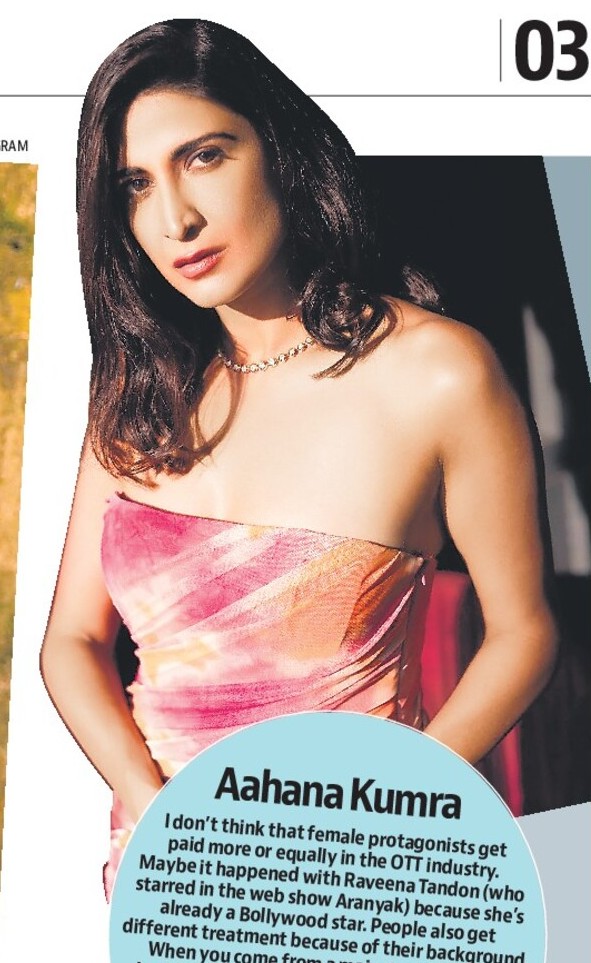Is there no gender-based pay parity on TV and OTT? Celebs speak up
8:23 AM
Posted by Fenil Seta

In an earlier interview, actor Raveena Tandon made heads turn with her statement that female protagonists get paid more in the TV industry, and even OTT is slowly catching up. Navya Kharbanda speaks to some prominent names from the small screen and digital medium to weigh in on the issue of pay disparity and share their experiences
Navya Kharbanda (HINDUSTAN TIMES; August 14, 2023)
Amit Sadh
The television industry has provided fertile ground for female protagonists to shine and to be the centre of the show. TV has given them a chance to get the same respect and recognition as their male counterparts. In fact, I agree that OTT platforms have also disrupted the traditional power dynamics of the Indian film industry. There is no doubt that we’ll be creating a level playing field for women to showcase their talent and creativity.
Karan Tacker
In television, whoever is the lead of the show gets paid more. Whoever brings in the most viewership for the show will be paid in accordance with that; it doesn’t matter what their gender is. I look at it in terms of, ‘Who’s running the show?’ I’ve never been in a situation where someone got paid more than me or when I’ve been paid more than someone. In the projects that I’ve been involved in, pretty much everyone gets paid according to what they bring to the table and they seem to be happy about it.
Nakuul Mehta
The TV industry is primarily a medium where actors, producers, directors and almost every artiste are women. If not more, female protagonists do get paid equally as their male counterparts. In a time when pay disparity has existed in mainstream cinema for years, the television industry is definitely paving the way for women to be equally valued and paid for their hard work. Time has surely taken a reverse turn, as women are far more valued now and are being paid better than they were earlier.
Erica Fernandes
The TV and OTT industries have been game-changers for female artistes. In most cases, female actors on TV get paid equally or more than men. This is a positive step towards gender equality in the entertainment industry, as it shows that women are valued for their work and talent. However, it is also important to remember that sometimes people are paid according to their experience and worth. It is not always a reflection of how hard one person has worked compared to the other. This is not the case for everyone and pay inequality is still a major issue in many industries. It is important to recognise and address this problem if we want to create a more equitable society.
Aahana Kumra
I don’t think that female protagonists get paid more or equally in the OTT industry. Maybe it happened with Raveena Tandon (who starred in the web show Aranyak) because she’s already a Bollywood star. People also get different treatment because of their background. When you come from a mainstream cinema background, you come with the mindset that, ‘Oh, I’m already a star in Hindi films, and I’m moving to OTT, so I should get a higher pay’. I don’t think that happens with other actors; in fact, I don’t think I get equal pay.
Divyenndu
In television, now and always, especially since the whole Ekta Kapoor era started, women have been at the forefront. Since then, they’ve been getting paid more because they play the leading roles. It’s a commercial business and at the end of the day, whoever is in the driver’s seat will get paid more. Gender isn’t really the deciding factor here. Whoever can attract more viewers will have a higher price. It is a very clear business principle: whoever controls the market will control the price.
Maanvi Gagroo
I don’t think female leads are paid equally or more than their male counterparts in the OTT industry, unless the woman is a significantly bigger star. The pay disparity scenario has changed from what it used to be 10 years ago. However, I don’t think there’s been a blanket change across the industry. Also, it differs from one project to another. There are times when I get paid more, and sometimes my co-actors are paid more. And the inequality is not just about the actor’s fee but also things like hotel, vanity van, flight, etc. that again vary for different actors.
Ridhi Dogra
In this profession, no project will be similar to another because of the people attached to it. I’ve experienced the difference in storytelling, as we see a lot of stories being told about women in OTT. The characters for women on TV and OTT are quite empowering. But in terms of pay parity, I do feel that OTT still has a long way to go. With TV, it is definitely true that women are paid equally or even more than their male counterparts. I’ve worked on both mediums, so I can speak for both industries. If you’re headlining a project and you’re the biggest star, then you will automatically be paid more. And talent is, unfortunately, not respected as much in our industry as marketing is.
Kavita Kaushik
It’s true that women are paid equally or more in the TV industry and I’m sure of it because I started my career on the small screen. I don’t think, unless I was a star kid, I would have been given a role like Chandramukhi Chautala in movies. I was paid a bomb during my tenure on (TV show) FIR. In fact, I think I was the highest-paid actor on TV at that time. In films, less performance-oriented roles are given to women. However, in my 20 years of career, I’ve seen that women are always considered important script-wise on television. I’ve never done any mainstream Hindi films, and whenever something was offered to me, the payment used to be peanuts, like almost no money.
Amol Parashar
In showbiz, there is no fixed pay scale or grade. An actor’s fee is negotiated based on the value they bring to a project through their skills and brand value. As much as we’d like to believe that it should be based more on the former, it’s mostly the latter — the belief that a certain person will bring in audiences and more eyeballs to the project. If my co-star is more famous than me (according to the producers), they’ll definitely be paid more, and vice versa. Since this value is subjective, it’s prone to biases and inaccuracies. No two actors will be paid equally in a project, irrespective of gender, unless they negotiate together, which is a rare occurrence. That is how this business works.

This entry was posted on October 4, 2009 at 12:14 pm, and is filed under
Aahana Kumra,
Amit Sadh,
Amol Parashar,
Aranyak,
Divyenndu,
Erica Fernandes,
Karan Tacker,
Kavita Kaushik,
Maanvi Gagroo,
Nakuul Mehta,
Raveena Tandon,
Ridhi Dogra,
TV News
. Follow any responses to this post through RSS. You can leave a response, or trackback from your own site.
Subscribe to:
Post Comments (Atom)
Post a Comment